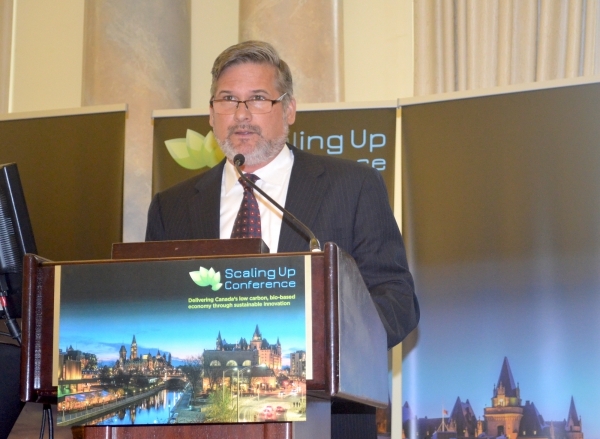
Scaling Up 2017 to bring together bioeconomy leaders
September 12, 2017
By Scaling Up 2017
Sept. 12, 2017 - Global leaders in the bioeconomy space will gather in Ottawa November 27 to 29, 2017 for Scaling Up 2017, the only conference of its kind in Canada that brings industry, finance, and government representatives together to discuss how to propel the global bioeconomy beyond pilot and demonstration plants to full-scale commercialization. The inaugural conference in 2016 featured more than 40 speakers from across North America and Europe.
 NRCan Canadian Forest Services ADM Glenn Mason discusses the role of biomass in Canada’s renewable power generation at Scaling Up 2016.
NRCan Canadian Forest Services ADM Glenn Mason discusses the role of biomass in Canada’s renewable power generation at Scaling Up 2016. Canada has one of the largest supplies of sustainable biomass feedstock in the world, including 10 per cent of the world’s forest. Along with the Government of Canada’s focus on clean growth and climate change, Canada is in an ideal position to capitalize on this emerging market.
“A full house for every session! It was great to see a real global mix from industry and government coming together to push forward the bioeconomy. Definitely one to attend in 2017,” says Freya Burton, Chief Sustainability Officer at LanzaTech headquartered in Illinois, with offices in China, India and New Zealand.
Many of the products Canadians use on a daily basis – plastic bottles, paint, diapers, cosmetics, electricity and fuels – can all be made from biomass. But despite the successes of pre-commercial biomass pilot projects and facilities in Canada and abroad, full-scale commercial roll out has been much slower than anticipated. Project financing continues to be a key obstacle, but government policy uncertainty, resistance from incumbent industries, the regulatory environment, and information gaps also pose challenges. All of these issues will be met head on at this year’s conference.
“No dreamers or self-promoters here. Instead, Scaling Up brought together veteran players and battle-scarred executives to compare notes on the real challenges of technology scale-up and how to overcome them. This event offered real value,” says Chris Hessler, Managing Partner of the DC consultancy AJW Inc.
“It’s at events like these that tangible progress towards a low-carbon economy happens, and the bioeconomy can play a significant role in reducing Canada’s greenhouse gas emissions,” says the Honourable Catherine McKenna, Minister of Environment and Climate Change, who spoke at last year’s conference.
The Organisation for Economic Co-operation and Development estimates that the world market for energy, fuels, materials, and chemicals derived from sustainable biomass, such as forestry, marine, and agricultural residues, will hit its stride between 2025 and 2030, with an estimated world market of between $2.6 and $5.8 trillion (USD).
“Canada needs to position itself to be part of this fast growing global market, or else in 10 years time, we will just be importing all our bio-based products,” says conference Chair Jeff Passmore. “We need to start adding value to Canada’s biomass resource.”
Read Canadian Biomass‘ coverage of last year’s conference: www.canadianbiomassmagazine.ca/bio-products/setting-the-stage-for-scaling-up-canadas-bioeconomy-5987
Print this page